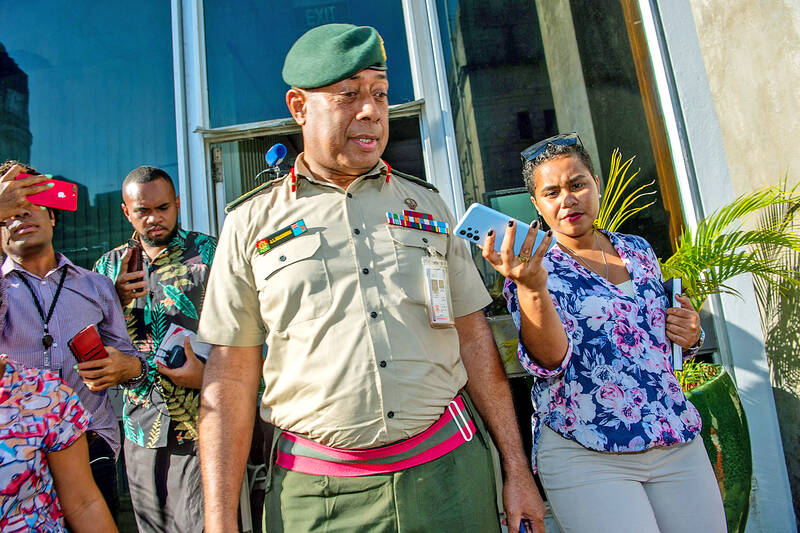Fiji’s military chief yesterday warned that reforms under Fijian Prime Minister Sitiveni Rabuka might contravene the constitution, but also pledged to respect the law and “stand with democracy.”
Fiji has had four coups in the past 35 years and the possibility of military intervention loomed over a tight general election last month.
Rabuka’s victory ended the 16-year rule of former naval commodore Frank Bainimarama, who seized control of the Pacific archipelago through a putsch in 2006. Under Fiji’s constitution — adopted in 2013 — the military has wide powers to intervene in politics.

Photo: AFP
Rabuka’s government has said that reviewing the constitution is one of its immediate priorities.
In a statement “authorized” by Major General Jone Kalouniwai, the Republic of Fiji Military Forces (RFMF) said it had “growing concern” over the ambition and speed of the government’s “sweeping changes.”
The military worries that the changes are being pursued “without full understanding” of procedures or are being “intentionally done to challenge the integrity of the law and the constitution of this land,” Kalouniwai said.
However, hours after issuing the statement, he said that the military would continue to “honor the current government that is in place.”
“Let me just reassure the public that the RFMF will continue to stand with democracy, we will continue to respect the law,” Kalouniwai told news Web site fijivillage.com.
The military chief did not single out any specific government reform for criticism.
Besides the touted constitutional review, Rabuka has said that the government plans to set up a “mercy commission” to decide on possible presidential pardons or reduced sentences for convicts.
The prime minister has rejected media suggestions that the commission is aimed at pardoning George Speight, a bankrupt businessman serving a life sentence after leading a coup in 2000.

Philippine President Ferdinand Marcos Jr yesterday vowed that those behind bogus flood control projects would be arrested before Christmas, days after deadly back-to-back typhoons left swathes of the country underwater. Scores of construction firm owners, government officials and lawmakers — including Marcos’ cousin congressman — have been accused of pocketing funds for substandard or so-called “ghost” infrastructure projects. The Philippine Department of Finance has estimated the nation’s economy lost up to 118.5 billion pesos (US$2 billion) since 2023 due to corruption in flood control projects. Criminal cases against most of the people implicated are nearly complete, Marcos told reporters. “We don’t file cases for

Ecuadorans are today to vote on whether to allow the return of foreign military bases and the drafting of a new constitution that could give the country’s president more power. Voters are to decide on the presence of foreign military bases, which have been banned on Ecuadoran soil since 2008. A “yes” vote would likely bring the return of the US military to the Manta air base on the Pacific coast — once a hub for US anti-drug operations. Other questions concern ending public funding for political parties, reducing the number of lawmakers and creating an elected body that would

A feud has broken out between the top leaders of the far-right Alternative for Germany (AfD) party on whether to maintain close ties with Russia. The AfD leader Alice Weidel this week slammed planned visits to Russia by some party lawmakers, while coleader Tino Chrupalla voiced a defense of Russian President Vladimir Putin. The unusual split comes at a time when mainstream politicians have accused the anti-immigration AfD of acting as stooges for the Kremlin and even spying for Russia. The row has also erupted in a year in which the AfD is flying high, often polling above the record 20 percent it

‘ATTACK ON CIVILIZATION’: The culture ministry released drawings of six missing statues representing the Roman goddess of Venus, the tallest of which was 40cm Investigators believe that the theft of several ancient statues dating back to the Roman era from Syria’s national museum was likely the work of an individual, not an organized gang, officials said on Wednesday. The National Museum of Damascus was closed after the heist was discovered early on Monday. The museum had reopened in January as the country recovers from a 14-year civil war and the fall of the 54-year al-Assad dynasty last year. On Wednesday, a security vehicle was parked outside the main gate of the museum in central Damascus while security guards stood nearby. People were not allowed in because